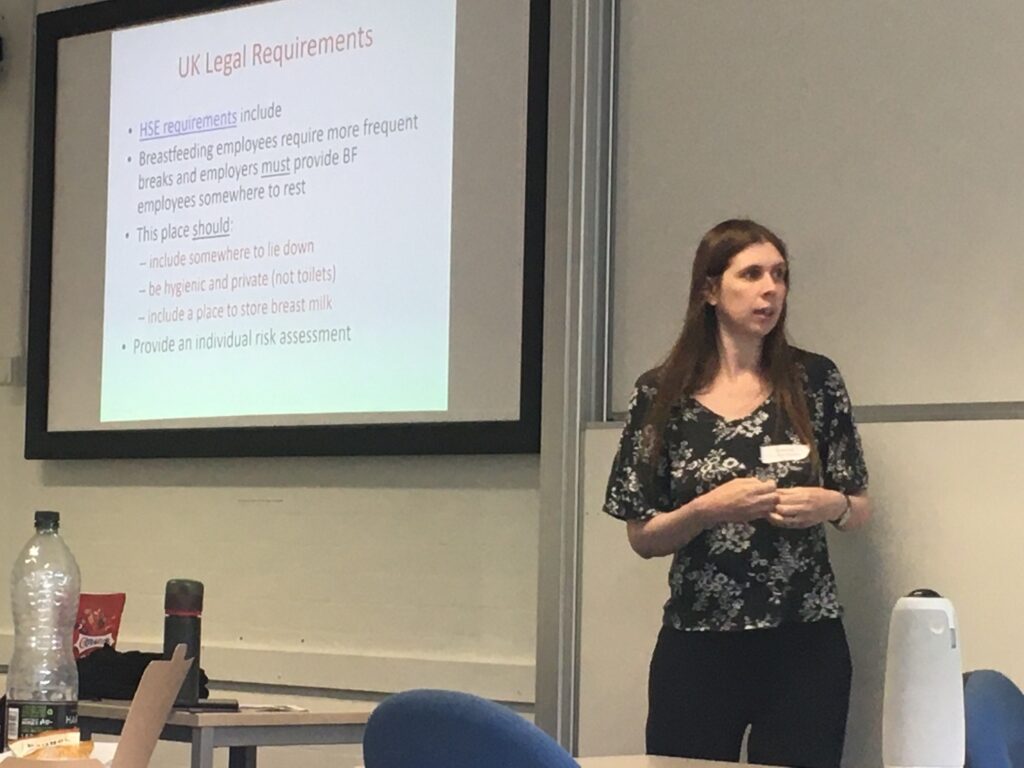Organisations and businesses may think that supporting breastfeeding employees may be difficult or expensive. However, in our study, Maternal Well-Being, Infant Feeding, and Return to Paid Work, the most common answer when we asked mothers what would have helped them balancing breastfeeding and return to work, was a conversation initiated by their line manager/employer.
Simply being asked what they needed and how the employer could help support, made breastfeeding mothers feel supported and valued.
Our study painted a picture of a lack of proactivity, workplace policy and open communication in the workplace. Mothers often felt that the onus is unfairly on them to ask employers for what they need, and to make compromises / adjustments to allow them to continue their breastfeeding journey. Whilst Line managers often said they lacked information, guidance and training to support breastfeeding employees and felt the burden was on them to make accommodations work.
Mothers often felt that the onus is unfairly on them to ask employers for what they need, and to make compromises / adjustments to allow them to continue their breastfeeding journey.
Professor Sarah Jewell
The Value of a Breastfeeding Policy
Surprisingly, only 23% of respondents to our HR survey said their organisation had a breastfeeding policy (whether a standalone policy or one as part of a maternity policy). Firstly, a breastfeeding policy provides clarity to both employees and line managers, in terms of responsibilities and workplace support available in the workplace. Secondly, a policy signals that the needs of breastfeeding employees are understood, valued and supported in the organisation.
Our study revealed that any conversations that did take place were often informal and brief; sometimes only brief encounters in corridors. Concerningly only 31% of who had informed their line manager/employer they were breastfeeding then had a risk assessment to consider their specific needs, a legal requirement. When conversations and risk assessments did take place they were often described as embarrassing and awkward by both mothers and line manages, leading to a sense of isolation and secrecy around breastfeeding.
Furthermore conversations often happened too late, when the mother returned to work, with only 37% in our HR survey stating communication took place before the mother went on leave. Mothers often face a multitude of anxiety and concerns before returning and communication prior to return can go some way to reducing these. Therefore facilitating open and inclusive conversations, that start before leave, can improve maternal wellbeing. It is good practice to start the conversation prior to leave, check in during leave, say during a keeping in touch day and then continue to have regular check-ins once mothers return. Often a mother’s specific needs change as their child gets older so having regular check-ins can be really useful.
Facilitating open and inclusive conversations, that start before leave, can improve maternal wellbeing.
Professor Sarah Jewell
A Discussion Can Help Identify Simple Solutions
Often adjustments and support mothers needs is temporary and every mother’s specific needs are different. Therefore a discussion can help identify simple solutions.
One common example in our study was anxiety around storing and transporting breastmilk, with many worried about the temperature of communal fridges, and some feeling uncomfortable storing milk with their colleagues lunch. Therefore something as simple as putting a thermometer on a fridge or buying a small portable fridge (that can be used by future breastfeeding employees) are simple steps that can make a huge difference.
Something as simple as putting a thermometer on a fridge or buying a small portable fridge are simple steps that can make a huge difference.
Professor Sarah Jewell
You can read the study’s full report here.
Book a consultation with Nourish to kick-start your employee breastfeeding policy for your workplace.


